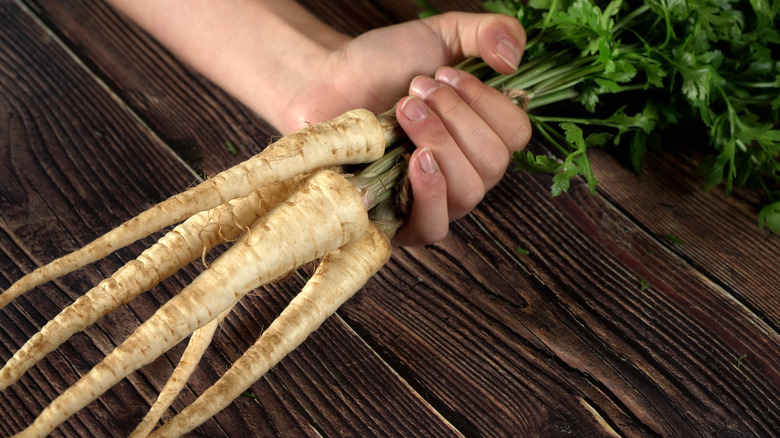An Underrated Root Vegetable High In Fiber Can Help Lower High Blood Pressure
Chances are, you probably have a few go-to vegetables on your weekly shopping list. A 2022 OnePoll survey (via SWNS) showed that 62% of Americans are fairly consistent when it comes to purchasing the same veggies every time they go to the store. That's understandable, but the next time you're in the produce aisle, you might want to embrace something different and bypass the instincts of your picky inner child. (By the way, being averse to certain foods isn't unusual — there are plenty of reasons you might be a picky eater as an adult.)
Trying new foods is a great way to expand your palate. And if you add a particularly underrated root vegetable into your diet, you could possibly do something good for your cardiovascular system in addition to kicking your pickiness. What beneficial root vegetable deserves to be placed in your shopping cart? It's called a parsnip.
From a taste perspective, parsnips have been described as earthy, sweet, spicy, and even nutty. Some say parsnips remind them of carrots, although they have a potato aspect as well. Parsnips can be swapped for other root vegetables in many recipes, making them easy to work with if you're unfamiliar with them. From a health perspective, parsnips may be particularly supportive of your heart and vascular system due to the substantial presence of two key nutrients: dietary fiber and potassium.
Packed with dietary fiber
The fiber content in parsnips is particularly impressive. For every one-cup serving of sliced parsnips, you get 6.52 grams of fiber. That's higher than you'll see in some other root and common vegetables. For instance, one cup of cubed sweet potatoes (another root vegetable) promises 3.99 grams of fiber. And one cup of chopped carrots offers 3.58 grams of fiber. With parsnips, you're getting at least 1.5 times more fiber in every tasty bite.
In some clinical trials, researchers have determined that consuming foods that are high in fiber may help lower blood pressure. In fact, a 2023 review in Cureus concluded that there might be a valid association between eating a diet high in fiber and experiencing low blood pressure. Meanwhile, according to a 2024 article in Hypertension, for every 5 milligrams of fiber consumed daily above recommended intake levels, adults could expect a 2.8 mmHg (millimiters of mercury) drop in their systolic and a 2.1 mmHg drop in their diastolic blood pressure numbers.
(Read about foods you should eat if you need more fiber.)
A reliable source of potassium
Parsnips aren't just fiber-filled; they also contain 499 milligrams of potassium per cup-sized serving. Potassium is a mineral that assists in removing excess sodium from the body, which can bring down blood pressure. Sodium is necessary for healthy body functions, but it can be a contributor to serious medical conditions. According to the National Institutes of Health, exceeding the maximum amount of sodium you should have in a day has been linked to high blood pressure and cardiovascular disease.
Potassium may help lower blood pressure, per a 2024 article in the Journal of Human Hypertension. Analyzing data from existing studies, the authors identified a correlation between increased potassium intake and a drop in systolic blood pressure levels. Moreover, individuals who are already hypertensive may experience even more pronounced blood pressure-lowering effects from increasing their potassium, per a 2020 review in the Journal of the American Heart Association.
Parsnips may offer other health benefits beyond their impact on cardiovascular functions. A 2021 review in the Journal of Pharmacopuncture concluded that parsnips may have antimicrobial, antifungal, and anti-inflammatory properties, among other attributes. And a 2020 study in Current Drug Discovery Technologies supported the potential use of parsnips to improve female fertility. Finally, a 2024 study in Frontiers in Nutrition determined that, due to their antioxidant content, parsnips might be valuable in improving respiratory health.



